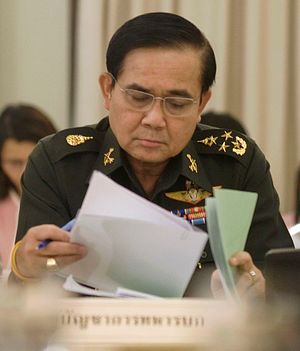While attending a summit hosted by Barack Obama in southern California last week, Thailand’s former army chief and current Prime Minister Prayuth Chan-o-cha reassured the American president that his country was still on the path to organizing fresh elections and restoring democracy—nearly two years since Prayuth’s own coup d’état brought down Thailand’s last democratically-elected leader.
Since overthrowing Yingluck Shinawatra’s government in May 2014, the ruling National Council for Peace and Order (NCPO) has repeatedly pushed back promised elections; polls that were originally slated for mid-2015 are now expected in 2017 (or even 2018).
Much of this delay has stemmed from the project to ratify a new constitution, particularly since the military-appointed National Reform Council (NRC) already rejected one exceedingly controversial draft last September. Possibly in response to accusations that a cyclical process (of presenting intentionally unacceptable drafts for rejection) would allow the NCPO to remain in power indefinitely, now-Prime Minister Prayuth insists 2017’s elections will go forward with or without a constitution.
Even though last year’s proposed constitution failed to make it past the NRC, a new draft – released on January 29th – still contains anti-democratic fail-safes (from the military’s perspective) and will still allow the NCPO to exercise unchecked control over the interim government and election process all the way through the formation of a new cabinet.
Last year’s draft document, for its part, was rebuffed in the face of withering criticism from both sides of the political divide. Among other stipulations, it would have allowed a panel of military and police officials to wrest political authority from the civilian parliament. The potential constitution now before the NRC’s successor body (the National Reform Steering Assembly, or NRSA) draws instead on Thailand’s currently disbanded Senate as a vehicle for inserting military prerogatives into the structures of the civilian state.
If the proposed constitution is adopted, the reconstituted Senate will comprise 200 appointed (i.e. unelected members) and will lack any stipulations for equal representation between the most important professions. With nothing preventing a Senate dominated by the army and the security services, the junta will have a free hand in creating a reliable voting bloc. A Senate with this slant would be capable of blocking legislation and hamstringing the executive branch. Furthermore, the draft allows for individuals outside of parliament (for example, Prayuth Chan-o-cha) to serve as Prime Minister.
As for the new document, both the Pheu Thai party—aligned with Yingluck and her brother (and fellow former premier) Thaksin Shinawatra—and its chief rival, Abhisit Vejjajiva’s Democrat Party, have come out against the undemocratic provisions, seemingly designed to prevent either one from instituting stable or effective civilian governance.
Pheu Thai accuses the constitutional project of aiming to “bonsai” the party by preventing it from securing a parliamentary majority or, failing that, to undermine the strength of an eventual Pheu Thai government (if not overthrow it outright through the Constitutional Court). Abhisit, for his part, took to his official Facebook page to call for the direct election of senators, protections for both community and individual rights, an election system other than the single-ballot voting currently specified by the draft, and specific stipulations for when and how an individual not serving in parliament could be selected as Prime Minister. As he put it: “The door shouldn’t be open permanently for persons who do not represent Thai people to head the executive branch.”
In a demonstration of just how stringently Thailand’s body politic opposes the new draft, even former premier Thaksin Shinawatra (currently in exile) broke his extended radio silence to speak out against it and urge the junta toward reconciliation. In an interview with the Financial Times from Singapore, Thaksin urged Prayuth and the NCPO to scrap the draft (which was, in his view, “crazy”) and instead called for dialogue with the public to avoid a protracted military dictatorship. The junta, however, was unreceptive to the former premier’s overtures and dismissed the former leader as a “fugitive.”
Of course, Pheu Thai and the Shinawatra family are most directly targeted by the military junta’s machinations and have the most to lose (at least in the short term) if the current constitutional draft is adopted. That being said, the complaints from both leading parties about the document’s illiberal and undemocratic elements—and the loopholes those provisions create—are easily justifiable based on the contents of the draft. Even Meechai Ruchupan, who heads the Constitutional Drafting Committee, referred to the document now before the National Reform Steering Assembly (NRSA) as “strong medicine” that was not necessarily designed to earn the buy-in of the political parties. Echoing previous comments from the junta leadership, Meechai and his drafting committee seem to see the country’s political parties—and, by extension, the public’s elected representatives—as a nuisance to be curtailed rather than the building blocks of a stable democratic order.
In those same remarks, Meechai admitted that the current draft would not necessarily prove lasting if adopted, despite being Thailand’s 20th constitution in 84 years. If it fails, not even its architect knows what the next steps would be. While Prayuth and the NCPO would prefer to drag out the interim process (to prevent a likely Pheu Thai victory in any election), growing domestic and international pressure is making it more difficult to sustain the current state of “emergency” rule—a period has led directly to the deterioration of Thailand’s relationship with Washington and other Western allies as well as falling exports and evermore draconian enforcement of Bangkok’s (in)famous lèse-majesté laws.
Rob Edens is a London-based researcher.
































